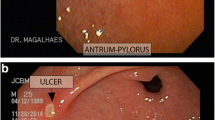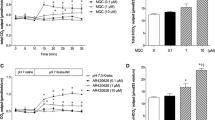Abstract.
Gastric pentadecapeptide BPC 157 (GEPPPGKPADDAGLV, M.W. 1419, safe in clinical trials for inflammatory bowel disease (PL 10, PLD 116, PLD 14736, Pliva, Croatia)) has a particular cytoprotective/adaptive cytoprotective activity. The cytoprotective/adaptive cytoprotection researches largely neglect that stomach distension could per se jeopardize the mucosal integrity, with constantly stretched mucosa and blood vessels, and sphincters more prone for reflux induction. After absolute alcohol instillation in fully distended rat stomach, gastric, esophageal and duodenal lesions occur. Throughout next 3 min, left gastric artery blood vessels clearly disappear at the serosal site, indicative for loss of vessels both integrity and function. Contrary, constant vessels presentation could predict the benefi cial effect of applied agent. After pentadecapeptide BPC 157 instillation into the stomach the vessels presentation remains constant, and lesions of stomach, esophagus, and duodenum are inhibited. Standards (atropine, ranitidine, omeprazole) could only slightly improve the vessels presentation compared to control values, and they have only a partial effect on the lesions. In this review we emphasize BPC 157 unusual stability, and some of its important effects: effectiveness against various lesions in gastrointestinal tract, on nitric oxide (NO)-system, and NO-agents effects, on somatosensory neurons, salivary glands function, recovery of AMP-ADP-ATP system, endothelium protection, effect on endothelin, and on angiogenesis promotion. It also antagonizes other alcohol effects, including acute and chronic intoxication. Given peripherally, it counteracts the consequence of central dopamine system disturbances (receptor blockade), and induces serotonin release in substantia nigra. Therapeutic potential of BPC 157 as a cytoprotective agent is also seen in its capability to heal various wounds. Given directly into the stomach, BPC 157 instantly recovers disturbed lower esophageal and pyloric sphincter pressure in rats after 12–20 months of untreated esophagitis. All these could be suggestive for its role as a natural protectant in gastric juice with particular function throughout stomach distension.
Similar content being viewed by others
Author information
Authors and Affiliations
Corresponding author
Rights and permissions
About this article
Cite this article
Sikiric, P., Seiwerth, S., Brcic, L. et al. Stable gastric pentadecapeptide BPC 157 in trials for inflammatory bowel disease (PL-10, PLD-116, PL 14736, Pliva, Croatia). Full and distended stomach, and vascular response.. Inflammopharmacol 14, 214–221 (2006). https://doi.org/10.1007/s10787-006-1531-7
Issue Date:
DOI: https://doi.org/10.1007/s10787-006-1531-7




